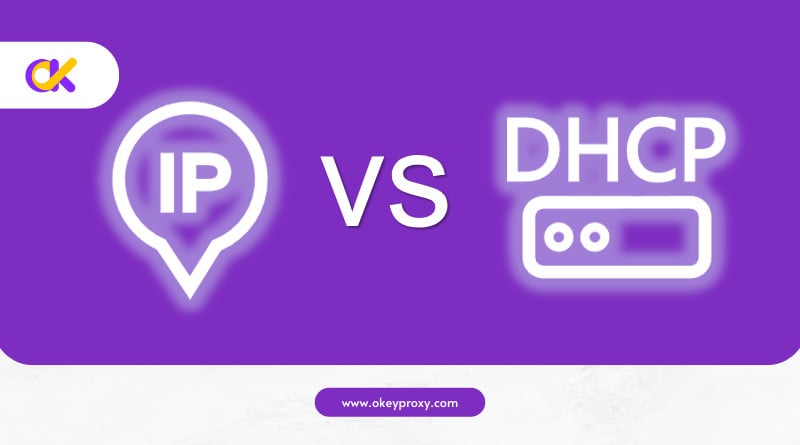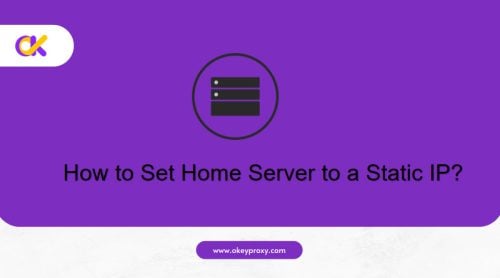In networking, selecting between a static IP and Dynamic Host Configuration Protocol (DHCP) for IP address assignment can significantly impact performance, security, and management ease. Handling the differences about static IP vs DHCP, along with their best use cases, helps network administrators, developers, and everyday users optimize their setups. This article delves into the details, exploring both approaches, highlighting their pros and cons, and providing insights into their best applications.
IP Addresses: Static or DHCP?
IP (Internet Protocol) addresses serve as unique identifiers for devices connected to a network. These addresses enable devices to communicate with one another over the internet. They can either be static, meaning fixed and unchanging, or dynamic, meaning they change periodically or after each connection.
What is a Static IP
A static IP address is a fixed, manually assigned IP address that does not change over time. Once assigned, this IP remains constant and is used exclusively by the device or server it was allocated to, ensuring consistent identification on a network.
Key Characteristics:
- Permanent, unchanging IP address.
- Manually configured in the network settings of a device.
- Often used for servers, printers, and networked devices requiring consistent accessibility.
What is DHCP
Dynamic Host Configuration Protocol (DHCP) is a network protocol that automatically assigns dynamic IP addresses to devices on a network. DHCP-enabled devices receive a different IP address each time they connect, depending on availability.
Key Characteristics:
- Temporary, automatically assigned IP address.
- Managed by a DHCP server or router.
- Primarily used for devices like smartphones, laptops, and IoT devices that do not require static addressing.
Essencial Differences Between DHCP and Static IP Addressing
-
Stability and Consistency
Feature Static IP DHCP IP Assignment Manual, fixed Automatic, dynamic Consistency Consistent (IP never changes) Variable (IP can change) Configuration Requires manual setup Automatically handled by DHCP server/router Reliability Ideal for systems requiring continuous access May cause issues if IP changes mid-connection Advanced tech of DHCP: IP Rotation for Seamless Web Interaction
-
Security and Privacy
Static IP: Static IPs are more predictable, which makes them more vulnerable to targeted attacks. Hackers can more easily find and exploit static IPs since they do not change.
DHCP: Dynamic IPs offer a layer of security through their unpredictability. Since the IP address changes frequently, it’s harder for an attacker to track or exploit a single IP.
-
Network Management and Scalability
Static IP: Managing static IPs can be cumbersome, especially in large networks, as each device must be manually configured. This lack of flexibility can hinder scalability.
DHCP: DHCP is highly scalable and requires less administrative effort. It automatically handles IP assignments, which makes it suitable for dynamic and growing networks.
-
Performance Considerations
Static IP: Static IPs offer better performance for services requiring consistent connections, such as web hosting, gaming servers, or remote desktop access. These services benefit from the stability of a static IP.
DHCP: Dynamic IPs are better suited for general use where constant connectivity isn’t a concern. Devices that frequently connect and disconnect from the network perform well with DHCP due to its automated management.
When Utilize Static IP vs DHCP?
Ideal Use Cases for Static IPs
Hosting Servers:
Static IPs are crucial for web servers that require a constant address for domain name resolution.Besides, Email services rely on static IPs for consistent delivery and to avoid issues with spam filters.
Remote Access:
Static IPs are ideal for remote desktop access or VPNs, where devices need to connect to a specific address for secure communication.
Surveillance Systems:
Security cameras and other monitoring systems often use static IPs to ensure they can always be accessed by the control center.
Corporate Networks:
In enterprise environments, devices like printers, routers, and key infrastructure elements benefit from having static IPs to ensure seamless integration and monitoring.
Ideal Use Cases for DHCP
Home Networks:
Most home networks use DHCP for simplicity. Devices like laptops, smartphones, and gaming consoles can quickly connect without manual IP configuration.
Public Wi-Fi Networks:
Public Wi-Fi in cafes, hotels, and airports uses DHCP to accommodate the varying needs of users connecting to the network. It allows for rapid IP allocation without overburdening the network administrator.
Corporate BYOD Policies:
In environments with Bring Your Own Device (BYOD) policies, DHCP ensures that employee devices can connect without manual configuration, offering flexibility in large-scale operations.
IoT Networks:
IoT devices benefit from DHCP when large numbers of devices need to connect without the overhead of managing individual IP addresses.
Which One Should You Choose? DHCP or Static IP?
The choice between Static IP and DHCP depends on the specific needs of the network. Here’s a breakdown of scenarios that might favor each option:
-
Network Size and Complexity
Small Networks: If a network consists of a handful of devices that require reliable connectivity, static IPs may be preferable.
Large Networks: For larger, more dynamic networks, DHCP simplifies management and reduces configuration time.
-
Security Needs
High-Security Environments: Static IPs can make monitoring easier, but they also pose a risk due to their permanence. Mitigate this risk by using strong firewall rules.
General Security: DHCP with additional security measures, such as MAC address filtering or VLAN segmentation, can protect a dynamic network effectively.
-
Performance Requirements
Performance-Critical Systems: Systems requiring stable performance, such as web hosting, benefit from static IPs. Ensure the network infrastructure can handle potential risks associated with static addressing.
General Use: DHCP is sufficient for environments where devices frequently join and leave the network, with no need for constant performance.
OkeyProxy: A Solution for Managing Static IPs [Tip]
For businesses and individuals needing the reliability and stability of static IP addresses without the hassles of manual configuration, as a static proxy, OkeyProxy provides an ideal solution. OkeyProxy offers premium static IPs that are geographically diverse and highly secure.

Benefits of Using OkeyProxy:
- Guaranteed Static IPs: No more worrying about changing IPs disrupting services. OkeyProxy offers consistent, reliable static IPs.
- Global Coverage: With access to IPs across multiple regions, OkeyProxy ensures you can maintain a presence in different locations without sacrificing performance.
- Security and Anonymity: OkeyProxy’s static IP services come with advanced security measures, providing anonymity and reducing the risk of attacks.
| Feature | Benefit |
|---|---|
| Static IP Stability | Ensure constant, uninterrupted connections |
| Global Reach | Access IPs from multiple locations |
| Enhanced Security | Protect against IP-based attacks |
Whether for web hosting, remote access, or business operations, OkeyProxy’s static IPs offer the consistency and reliability necessary for critical applications. Visit OkeyProxy for more information on their static IP services.
Get a Free Trail of OkeyProxy with Static IP!
Conclusion: Choosing the Right IP Assignment Method
The choice between static IP and DHCP depends on your specific needs, network complexity, and performance requirements. Static IPs provide stability and reliability for critical services but require manual configuration and security measures. DHCP simplifies network management and is ideal for dynamic environments where devices frequently connect and disconnect.
By evaluating the use cases and challenges of both methods, you can make an informed decision tailored to your network’s unique requirements. And for those seeking a reliable static IP solution, OkeyProxy provides a robust platform that combines global reach with enhanced security.







